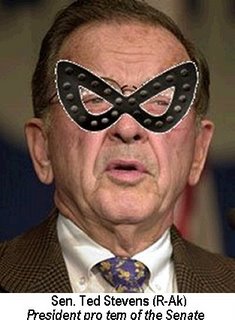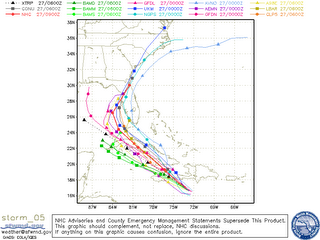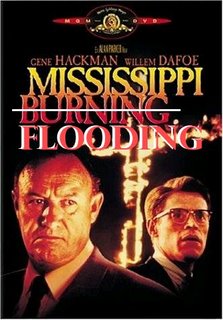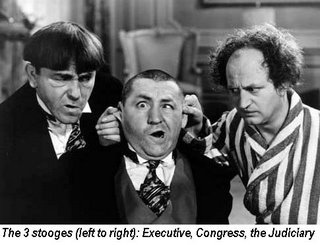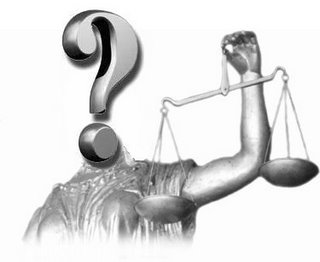
Florida appeals court judges never have to run against any human opposition. That indignity is reserved only for trial court judges... .
Northwest Florida voters, both Republican and Democrat, who turn out September 5 for the Primary Election will be asked, among other things, to choose three new circuit court judges. Eight candidates are seeking one of three judicial positions that appear on the "Non-Partisan Ballot" for Escambia, Santa Rosa, and Okaloosa counties.
Voter's Dilemma
For most voters, being asked to select a judicial candidate poses a real conundrum: who to vote for when you don't have a clue what the candidates will do if they're elected --
and the very
rules of the judicial system practically forbid them from telling you? Unless you know a candidate personally, it always feels like a crap-shoot. That's why so many voters just skip over the judgeship lines.
Our view is that, nevertheless, voters have a civic responsibility to vote for any position that presumes to be filled by the democratic forces of the ballot box. If you don't know the candidates, then you should check them out. Hear them speak, if you can. Read their campaign literature. Spend time on their web sites. Pay close attention to their personal and professional biographies. Ask friends and family what they know about the candidate (some may have been clients). Check with local lawyer or judge friends to see what they think of your preliminary impressions.
This year, for what it's worth, our lawyer friends tell us we have it about right. Your lawyer friends may think otherwise, so as in all such matters you should do your own homework.
The Florida System for Picking JudgesOf course, there are judges and then there are judges. The
selection rules in Florida differ according to the judicial level.
Florida
appeals court judges never have to run against any human opposition. That indignity is reserved only for
trial court judges; and only then in those parts of Florida -- like Escambia, Santa Rosa, and Okaloosa counties -- which have decided under a local option to continue allowing sitting trial court judges to be opposed for reelection by another actual candidate.
Even here in Northwest Florida, however, incumbent trial court judges usually run unopposed. This is because no lawyer with any sense who hopes to put food on the family table would risk alienating a sitting judge by running against him (or her) and then losing. That's as foolish as kicking the dog and then expecting it to lick your hand.
In the entire history of Florida,
no sitting judge has been turned out of office on a retention ballot where the ballot question is framed as "yes" or "no".
It happens that this year, however, two new trial court judgeships for the area were created by the Florida legislature -- far too few, given the skyrocketing caseloads, but it's a start. A third one is vacant because of mandatory retirement rules.
Since there are no incumbent judges in these three positions, vigorous contests with actual, human opposition candidates have arisen at the Circuit Court level. That doesn't make the voters' job any easier. Instead of paying attention to a sitting judge's decision-making record, you're being asked to guess how well a lawyer you probably don't know who's never done it before might perform as a trial court judge. It's not easy, but it's possible to make some educated guesses.
Circuit Court GroupingsMerely as a matter of convenience, candidates for circuit court judge are placed in numbered "groupings" by election officials. The group numbers are arbitrary; each pertains to a single judicial vacancy. None bears any necessary relationship to a subject matter specialty or anything else.
To win outright on Primary Election day, a candidate must
receive at least 50 percent of the votes cast. Otherwise, the top two run-off candidates will appear on the General Election ballot in November.
The locally contested groupings and opposing candidates for the three judicial slots are listed by the
Pensacola News Journal here. On that page, the newspaper provides hyperlinks to campaign web sites for all but one of the candidates. (The mysterious exception is Terry Ketchel, about whom we have more to say below).
Candidates also answered a few questions put to them by the PNJ. You can
read their answers here.The information provided on various "candidate" web sites ranges from sketchy (see Jim Messer, below) to high-tech digital video clips (Michael T. Webster). For the most part, candidates offer straight-forward biographical stuff -- law school attended, academic achievements (if any), military service (if any), past professional work, civic volunteer record (if any), occasional mention of a past or present client of note, and sometimes a soaring generality or two about "serving justice" or blasting "judicial activism."
Of all of those things, what we pay the
least attention to are the military records. We're electing a trial judge, after all, not a field general.
We also tend to be skeptical of platitudinous paeans to Lady Justice. Although the ability to write clearly and with precision is important for a circuit court judge, we're not electing a novelist or poet here.
Frankly, too, we're offended when a judicial candidate makes cutting remarks about other judges "legislating from the bench" or decries "judicial activism," as too many candidates did in
their answers to the Pensacola News Journal. That's just political clap-trap, nowhere more so than when it comes to the daily grind of a Circuit Court trial judge position. It demeans the candidate who uses such rhetoric as much as it wrongly diminishes the judiciary as a whole.
This year, all eight candidates are men. No women have sought to be on the ballot. Only one of the eight candidates has demonstrated a creative grasp of modern technology by including digital clips of himself talking to you, the web viewer, about his background and philosophy. That's Michael Webster, and you can
see and listen to him here by clicking on "Mike Webster Answers Specific Questions."Group # 15 Candidates
There are four candidates running for this one trial court judicial position. We have listed them, below, in the same order as they appear in the PNJ article and on your ballot. In parentheses, we indicate each candidate's current city of residence. That, too, is of little consequence when it comes to where in the 3-county area the judge eventually may wind up wielding his gavel.
(1)
Candidate Mike Shofield (Pensacola). Essentially, the 47 year-old Shofield's background looks to us like that of an insurance defense attorney. Nothing wrong with that -- if you're an insurance company.
We've seen and heard little else that's remarkable about his academic or professional record, much less anything that leads us to conclude he has the temperament, sensitivity, or patience required of a circuit court judge. Quite the contrary, actually. Something about a temper tantrum in front of other lawyers shortly after he was pinched for a minor traffic offense.
(2)
Dixie Dan Powell (Crestview). Among a few Yankee transplant voters we've spoken with, the joke about Dixie Dan Powell, age 49, is that the name says it all. Someone we know very well says he's already used the name in a novel he's writing which is set in the deep South.
Mr. Powell is a general practititoner, which is not surprising in the small town of Crestview. He heads up what looks to be a classic small town law firm that's had a Powell family member in the firm's name for generations -- and, we would hazard to guess, a Powell Family Farm on its client list for almost as long.
Powell may be right when
he told the News Journal "
I have tried more civil and criminal jury trials than all of my opponents combined." One of our lawyer friends says Mr. Powell is a genial fellow who, he believes, would give the little guy as fair a shake as large corporations. A Crestview local tells us he mostly thinks of Dixie Dan Powell as a substantially diminished version of his well-liked father. Given the widely recognized family name, who knows? He might be the front-runner.
(3)
Terry Ketchel (Ft. Walton Beach/Shalimar). The PNJ article does not have a link to any web site for this candidate. But we found one for his law firm here --
http://www.fedcontractlaw.com/ It includes an extensive biography of the man. As we checked out Ketchel's "fed contract law" web site, we saw several things of interest; few of them, to our way of thinking, in Ketchel's favor as a judicial candidate.
First, there's nothing either manifestly spectacular, or obviously bad, about this 50 year-old's academic or professional background. Just so-so, as near as we can tell.
Second, he makes much of his G.O.P. political connections. Indeed, his resume is peppered with almost as many mentions of his Republican Party political affiliations as of his professional lawyering work -- a particularly odd choice when you appreciate that this is
a law firm web site and not one specially created for the judgeship race.
Mr. Ketchel candidly tells readers that he was an aide to some (unnamed) Republican congressman in a "leadership" position in Washington D.C. Then, he says, he became a branch managing attorney with two (also unidentified) large law firms 'with a national presence' (i.e, a D.C. branch office). Oddly, however, he doesn't say who they were or what he or the law firms did. Nor why he left each after a relatively brief time.
Twice, it seems, he has been an unsuccessful candidate for Congress. We don't know where because he doesn't say. We have to assume he lost both times.
His law firm's "fed contract law" web site is a turn-off for us. The web site makes it clear that Ketchel does a heavy amount of business negotiating defense procurement contracts and appealing U.S. agency procurement decisions when his Pentagon procurement clients don't get everything they might want. (When do they ever?)
In our view, federal contracting work often is less "litigation" than paper-shuffling desk work, congressional and Pentagon lobbying, and occasional brief writing. Mostly lobbying. As one of our lawyer friends says, this kind of legal business is just about the worst preparation one could have for a state circuit court judge position that deals primarily with a large volume of cases concerning the daily agonies of average, powerless American citizens.
Ketchel
told the PNJ that he has "
conducted numerous trials ... as well as complex construction cases" in Florida and "throughout the Southeastern United States." Maybe he's tried those cases. But the judges conducted them.(4)
Michael T. Webster (Ft. Walton Beach/Shalimar). Mr. Webster, 58, may be the dark horse. An annoying song lyric some fan composed greets visitors to his web site, claiming that Webster is the "most qualified." Surprisingly, perhaps, there's ammunition to back that up.
Webster graduated "with honors" from Florida State University Law School and he has an undergraduate degree in mathematics.
Mathematics! For a lawyer that is unusual. On the face of it, then, he's no dummy.
He also has what appears to be a very impressive record as a Navy pilot. But unlike some candidates in other races he doesn't make too much out of that. That comparative modesty is a plus, as far as we're concerned.
He is one of the few candidates who has achieved the highest possible Martindale-Hubbell rating for lawyers, if you put stock in such things. Martindale-Hubbell is a law directory whose ratings for individual lawyers are based on random sample ratings by local peers. It's far from perfect (among others, Ralph Nader has bitterly criticized it) but it's about the only rating system available.
In our view, what distinguishes Webster as a judicial candidate compared to the other three are two things: (1) he has specialized in family law for many years; and (2) in one of the campaign "interview" tapes which you can view on his web site he mentions quite off-handedly that he has the support of a lot of "social workers" and teachers in the area.
We called a few and they say it's true.
Our choice for Group # 15: Michael T. Webster
Reasons: A circuit court judge over time will spend a very substantial part of his time handling family law and family-related cases. Legal scholarship, raw brains, and even litigation experience are less important in that job, we think, than sensitivity to ordinary people's needs and the lives they lead. A circuit judge should have a very acute sense of equity as well as a sound understanding of the law governing average folk.
Mr. Webster appears to be qualified in the brains department. And he's the only candidate with an abundance of experience in the family law area.
We will vote for Michael Webster. You can make your own mind up.
Group 23 Candidates
Two lawyers are running for this slot. Both appear qualified.
(1)
Jeff Lewis (Pensacola), age 51, is working on a second career. He first became an industrial engineer, as you can read on his campaign web site. Later, he returned to attend the University of Alabama Law School in the early '80s. His father apparently was a distinguished UA law school graduate and editor of that school's law review. Oddly, Lewis mentions nothing about his own law school accomplishments, from which one might assume his academic career wasn't quite as sterling as his father's.
He spent six years with Curtis Golden's office as a prosecutor, then 5 years as a solo practitioner, then worked as juvenile public defender in Milton, and now is back in Pensacola with the Public Defender's Office. Altogether, none of them great career moves, perhaps, but presumably they have given him quite a bit of useful experience in criminal and juvenile law matters, which is very nearly the other half of a circuit court judge's job.
For what it's worth, several of our local lawyer friends all say they're voting for Lewis.
(2)
Gary Bergosh (Pensacola). Friends report that Bergosh is gaining a lot of name recognition because his campaign signs and billboards are visible everywhere. It appears he has invested far more money in this campaign than any of his opponents.
Judging from his web site biography he, too, has extensive criminal law experience. But much of it has been inside the JAG Corps, which isn't the most pertinent training ground we can imagine. He also makes a big deal out of one year in private practice representing the Navy in civil litigation, which seems to us of no particular consequence.
Bergosh's current position sounds like a good reason to go looking for another job: "working with the Department of Defense Education Activity." On the other hand, he chairs the local Legal Aid board of directors, which we consider a plus.
Bergosh, age 39, currently serves as a member of the Escambia County School Board. Hard to say if that's a plus or a minus. Without a doubt, it has a reputation of being one of the least effective school boards in the known Universe.
Our choice for Group # 23: Jeff Lewis
Reasons: We don't know either candidate personally. Neither one has a knock-out resume. Nor has either one had the kind of outstanding career that would make the choice easy. Both have spent most of their professional years working as subordinate lawyers in highly controlled, restrictive bureaucratic agencies -- one mostly with the Navy JAG and the other mostly with local prosecutor and public defender offices.
Both stooped to judiciary-bashing in their
answers to the News Journal. Bergosh, however, takes that balderdash to a ridiculous level when he feverishly claims that supposed
"judicial activism" is "the most important issue facing the judiciary." What tips the scales in favor of Lewis, for us, are three things:
(1) He has broader and much longer local state court experience in both Santa Rosa and Escambia counties, working with both adults and juveniles. If done right, that kind of work would have brought him into frequent, extensive contact with many local state court judges and law enforcement officers as well as medical, psychiatric, education and other professionals who will be appearing frequently as court resources or appear as witnesses in a great many Circuit Court cases. He's had extensive experience with the criminal law from all three sides (prosecution, defense, and juvenile). By contrast, Bergosh's experience is related somewhat more to federal law -- and even that appears to have been fairly narrow in its scope, mostly military law.
(2) Our lawyer friends all report they intend to vote for Lewis. They have a strong aversion to what they see as Bergosh's cyncial use of the military uniform during his campaign. While not dispositive, we think it is important that a new judge have the respect of the lawyers who will be appearing before him.
(3) Lewis' opponent, Bergosh, has overdone it with the political endorsements, in our view. Out of seven prominent endorsements
he claims on his web site, not one comes from a local lawyer or legal professional. Instead, they're mostly from politicians like Jeb Bush, Jeff Miller, GOP candidate for governor Charlie Crist, and military brass.
We will vote for Lewis. You can make up your own mind.
Group # 24 Candidates
If we didn't know better, we might suppose the judicial position presently known as Group # 24 is reserved for candidates with a close connection to powerful Pensacola lawyer Fred Levin. Both candidates have toiled within Levin's chambers. One toils on as his son-in-law as well as a firm partner.
Jim Messer (Pensacola) has the most distinguished military record of all the candidates. He is a Vietnam War vet who in 1969 earned the Silver Star for "conspicuous gallantry and intrepidity in action" and the Bronze Star for "heroic achievement in connection with combat operations against the enemy." If he were running for the most courageous veteran soldier on the ballot, he'd get our vote hands down.
His professional resume, however, is undistinguished; neither bad nor particularly outstanding. After Vietnam, he eventually enrolled and graduated from law school at the University of West Virginia. He burnished that with a Master's in Law from George Washington University five years later. Normally, a Master's in Law is at most a two year program. What happened in between? He isn't saying on his web site.
Messer, age 59, does report that he worked "as a Federal Prosecutor in the Narcotics and Dangerous Drug Section, Criminal Division, U. S. Department of Justice" but he doesn't say when or for how long. He also worked "as the Chief Litigation Attorney for Escambia County" but, again, he doesn't say when or for how long.
What we do know is that a year ago Escambia County was happy enough to
retain Messer as the county's alternate "conflicts" lawyer. Thus, he became the go-to guy when the county attorney himself "is precluded from representing the county and/or its employees." That's a plus.
Messer's web site doesn't mention that he once worked as a Levin Firm attorney. We have no idea why. Altogether, he claims "thirty years experience as a trial attorney" but discloses few details that would help determine the nature and breadth of that experience.
Is Jim Messer merely a journeyman lawyer, neither good nor bad? Or, has he tried important or complex cases that would shed light on his vast legal knowledge and skills? As with so much else he isn't saying, at least not on his one-page web site.
Ross Goodman has a much more impressive academic background. Vassar undergraduate. Top academic honors at the U. of Florida law school, law review editor (which many lawyers would consider a big deal).
He also is married to Circuit Court Judge Marci Goodman. Although he mentions her as his spouse, he doesn't exactly disclose her own judgeship on his campaign web site. But
he has given interviews about it.
If he wins the judgeship, Goodman said he expects that the only problem with serving in the same courthouse as his wife would be logistical. For example, if the family went on vacation, Santa Rosa would be without two of its three judges.
Goodman said a husband and wife serving as judges is "not unprecedented," citing a couple in South Florida.
Also going unmentioned is that the Honorable Mrs. Marci Goodman is the daughter of Fred Levin. We can't hold that against him. To the contrary, the Honorable Judge Marci Goodman is an outstanding member of the local bench. If her service has inspired her husband to try for a judgeship, so much the better.
In addition to being a civil trial lawyer and a partner with the Levin firm, Ross Goodman has been a "visiting professor" in the University of West Florida's Criminal Justice program the last couple of years. By all accounts he's done a solid job.
He must be held in high esteem by many other local lawyers, as evidenced by his being selected to join
the state Board of Bar Governors. He contributes his own time as well as the usual money to several worthy local causes, including anti-delinquency programs where he's been a volunteer for many years.
Our choice for Group # 24: Ross Goodman
Reasons: Again, both candidates have plenty to offer as a circuit court judge. But on academic record, breadth of experience, civic volunteer spirit, and professional reputation within the local lawyer community we'll be voting for Ross Goodman. You can make your own mind up.
